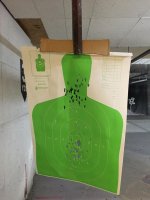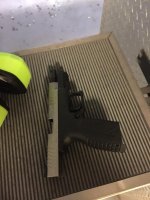The biggest reason people warn you on being careful on what ammo you get...
Other than the fact that there are several other cartridges/calibers that have a very similar name/designation as the proper ammo for your pistol.
Is that the 9x19 is the most popular pistol round in the world. It's use by the military has lead to a variety of ammo that is dimensionally the same, and would fit in your pistol, but could damage it. The biggest danger, and one likely only to be encountered when buying old bulk military or unknown ammunition... Is "machine gun" rounds. These are bullets intended to be used in sub-machine guns. The bullets are loaded "hotter"... A term used to describe bullets loaded with extra gun powder, to give the bullets more velocity/power.
As was mentioned the 9mm you have uses a caliber that goes by many names, usually based on who and where the ammo is made.
9mm Luger is the most common name, especially with domestic makers
9mm parabelum/para is common as well, foreign ammo makers use it more
9x19 the military designation, some domestic makers and foreign use this
9mm nato is often used for ammo that is made to military specs. The military spec calls for more powder than standard. It's not machine gun levels though.
You may also see 9mm+p, more so with hollow point defensive ammo, this marking designates a round that is loaded hotter than standard. The nato spec is very similar to this.
+p is a recognized standard by the regulatory agencies responsible for maintaining the standards used to manufacture ammunition. Most modern pistols can shoot this safely. Consult the owners manual... As was mentioned, +p is an effort to add power to the round. It also increases recoil and blast.
Most quality modern hollow point bullets have actually made +p obsolete, as their performance is improved over older bullet designs. So that added velocity and power, and the negatives of increased recoil and blast are not needed to be effective.
Federal HST, Hornady Critical Defense, Speer Gold Dot, are all good respected hollow point loads that you can use if you plan on using the pistol defensively.
Hollow point ammo limits over penetration of a target, so it is preferred for defense use. Lower chance of collateral damage... Judicious marksmanship is still very important though.
If you see +p+, it is ammo loaded even hotter than +p... Know that it is not a recognized standard, almost all pistol manufacturers recommend against its use.
The wrong ammo can cause issues, some dangerous. 9x18 may sound like it's just a little shorter, and should work fine... But it is a Russian caliber, and their 9mm is actually just a bit larger in diameter. If you tried to fire it in your pistol, if it managed to go off, it would likely damage the pistol, and you...maybe even injury to others... Potentially severe.
Other ammo may not be necessarily dangerous, but it would not work properly in the gun and cause much frustration. 9x17 is an example.
The manual should cover cleaning, but there are plenty of videos on proper cleaning. A basic cleaning kit will get you started, I am partial to the Otis brand stuff, but it is a bit more costly.
Some advice... The pistol does not need to be cleaned spotless after every trip to the range. Just get most of the gunk out and you will be fine. Ten minutes is all it takes when you get the hang of it. I wipe all the parts with a rag to remove the bulk of the gunk, then wipe it with a cleaner rag to get much of the remaining, and to prep the parts for lubricant. I clean the barrel with a couple passes of a cleaning brush and patch... Then I apply lubricant as is necessary. The manual will tell you how to lube.
A handgun beginners course is not a bad idea. You will be tonight the basics on proper stance, grip, trigger control, proper sight use... And most importantly... Safety.
It's not hard to simply shoot/discharge a firearm... But it does take practice and skill to do it well and in a safe manner.
An experienced friend can be a good way to learn at least some basics... But unfortunately not all "experience" is good experience. Bubba next door may own a lot of guns, but that does not make him actually competent with one.
But someone like many of the more active members here, who demonstrate themselves as knowledgeable and willing to continue learning, would probably make a good teacher for the basics.
A professional instructor is a safer bet most of the time.
Watch videos, read forums, ask questions, take a class or two... These things will help you a lot.
Edit:
Answer your range question.
Most ranges (especially indoor) will offer eye and hearing protection, and targets too... But having your own is always best.
Public ranges will most likely not provide that stuff, they may not even have target stands. That's the trade for being free.
Also, there are several respected gun channels on YouTube that cover many topics which you have asked about. You can learn a lot from those channels... And while a class would be good, you may at least learn the basics on safety, grip, stance, and proper use of the sights.


